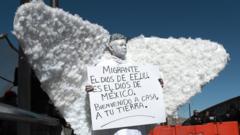The recent calamity of Cyclone Chido has intensified long-standing tensions regarding undocumented immigrants in Mayotte, with local leaders calling for more stringent government action to deport those residing in slum areas affected by the cyclone.
Cyclone Chido Sparks Calls for Immigration Crackdown in Mayotte

Cyclone Chido Sparks Calls for Immigration Crackdown in Mayotte
Following the devastation of Cyclone Chido, unrest over undocumented immigrants in the French territory of Mayotte intensifies as local leaders advocate for deportation.
After Cyclone Chido wreaked havoc on the French island territory of Mayotte, many locals are voicing their frustrations over undocumented immigrants residing on the island. Just days after the cyclone struck on December 14, destroying shantytowns primarily inhabited by immigrants from Comoros, local leader Safina Soula expressed her approval of the destruction, labeling it as a “divine Wuambushu,” which refers to the ongoing slum clearance initiative launched by French authorities last year.
At least 39 people lost their lives due to the cyclone, and its aftermath has sparked a renewed call for heightened immigration controls. Nearly a third of Mayotte's 320,000 residents are undocumented immigrants, and many inhabitants of the island, known as Mahorais, have long associated this population with increased crime and competition for resources in a region that struggles with high levels of poverty.
Though the islands of Mayotte and Comoros share cultural and historical ties, they diverged politically in a 1974 referendum when Mayotte opted to remain a part of France, while Comoros became an independent nation. The complexity of the immigration situation, fueled by economic hardship and humanitarian conditions in the region, continues to polarize sentiments among local residents, making the government's response critical in the coming weeks.
As French authorities face mounting pressure, the recovery efforts from Cyclone Chido will not only examine the physical reconstruction but also address the socio-political dynamics surrounding immigration that the natural disaster has exacerbated.
At least 39 people lost their lives due to the cyclone, and its aftermath has sparked a renewed call for heightened immigration controls. Nearly a third of Mayotte's 320,000 residents are undocumented immigrants, and many inhabitants of the island, known as Mahorais, have long associated this population with increased crime and competition for resources in a region that struggles with high levels of poverty.
Though the islands of Mayotte and Comoros share cultural and historical ties, they diverged politically in a 1974 referendum when Mayotte opted to remain a part of France, while Comoros became an independent nation. The complexity of the immigration situation, fueled by economic hardship and humanitarian conditions in the region, continues to polarize sentiments among local residents, making the government's response critical in the coming weeks.
As French authorities face mounting pressure, the recovery efforts from Cyclone Chido will not only examine the physical reconstruction but also address the socio-political dynamics surrounding immigration that the natural disaster has exacerbated.






















